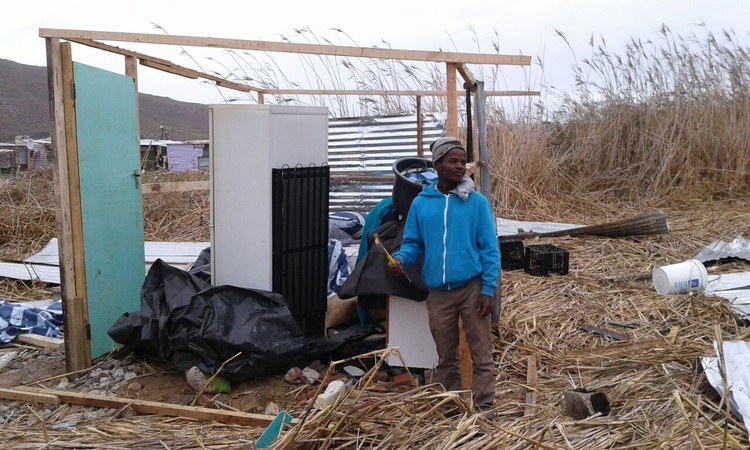Masiphumelele residents question City’s compliance with court interdict
“They asked me if it was my house. I went inside but they knocked it down anyway.”
Masiphumelele residents believe the City of Cape Town has not held up its end of a court order which prevents further structures from being erected at two vacant plots in the area.
The court order was obtained by the City and the South African National Parks on 20 April 2016 against any person occupying or attempting to occupy or erect structures on Erf 5131 (more commonly known as Phase 4) and the Wetlands informal settlement. Residents have previously told GroundUp that former mayor Nomaindia Mfeketho acquired the Phase 4 land in 2013. It has stood vacant for years, but part of the land is a sports field. The land is situated next to the new Phase 4 housing project which is expected to provide houses for backyarders and some residents living in the informal settlement.
According to the City’s interdict, a copy of the order should be served by reading the contents by a loudhailer at the property and by erecting a notice board at the entrance to the property. But this week, residents say they have never seen the City’s interdict.
GroundUp visited the Wetlands, where informal structures have been demolished nearly every week, and no notice board informing potential occupants of the court order was seen.
Herold Ncwaba lost his shack in the latest wave of demolitions on 11 June. Ncwaba said that he had begun settling into his new home when it was demolished. He had just spent two days at the community hall after his shack was destroyed in a storm that hit Cape Town nearly two weeks ago.
“I finished building my house on Saturday night and putting all my things back. My bed had also dried,” said Ncwaba. His shack was demolished by the Anti-Land Invasion Unit the next day. Ncwaba said demolishing started while he was still inside.
“I was not worried because they were not doing anything to the shacks with furniture in. They asked me if it was my house. I went inside but they knocked it down anyway while I was inside,” said Ncwaba. He said that his requests to save some of his belongings were ignored.
Ncwaba said he rebuilt his shack that same night.
Community leader Dumisani Nhlapo said that he had asked for a copy of the interdict which he never received.
Xanthea Limberg, the City’s Mayoral Committee Member for Informal Settlements, said that the demolished shacks were unoccupied, despite claims by residents such as Ncwaba.
“The City does its best to prevent the illegal occupation of land which becomes an extreme flood, fire, safety and hygiene risk. We can see these risks visibly in the illegally occupied areas in Masiphumelele, such as the wetland area which is below the flood line and not suitable for human habitation,” she said.
In response to questions about the notice board, Limberg said: “The Sheriff of the Court is responsible for putting up notices in compliance with the court order. These boards were removed immediately after the Sheriff left the area, as is a common occurrence. The Sheriff also handed out copies of the order to the community that was present.”
Limberg said that a copy of the interdict was also read at a meeting with community leaders in February 2017.
Another community leader Tshepo Moletsana confirmed Limberg’s statement that the interdict was read out to them in February. “There are absolutely no signs. People build houses not knowing that the land has been interdicted. They did it at Erf 5131, but not in the Wetlands,” he said.
Support independent journalism
Donate using Payfast

Next: Lenasia celebrates International Day of Yoga
Previous: Prisoners across the country demand parole hearings
© 2017 GroundUp. 
This article is licensed under a Creative Commons Attribution-NoDerivatives 4.0 International License.
You may republish this article, so long as you credit the authors and GroundUp, and do not change the text. Please include a link back to the original article.

